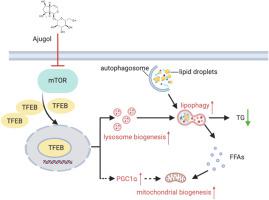Pharmacological Research ( IF 9.1 ) Pub Date : 2021-10-31 , DOI: 10.1016/j.phrs.2021.105964 Heng Zhang 1 , Junfeng Lu 2 , Hao Liu 3 , Lingling Guan 3 , Shiqing Xu 3 , Zai Wang 3 , Yang Qiu 4 , Honglin Liu 3 , Liang Peng 3 , Xiuli Men 5

|
Lipophagy is the autophagic degradation of lipid droplets. Dysregulated lipophagy has been implicated in the development of non-alcoholic fatty liver disease (NAFLD). Ajugol is an active alkaloid isolated from the root of Rehmannia glutinosa which is commonly used to treat various inflammatory and metabolic diseases. This study aimed to investigate the effect of ajugol on alleviating hepatic steatosis and sought to determine whether its potential mechanism via the key lysosome-mediated process of lipophagy. Our findings showed that ajugol significantly improved high-fat diet-induced hepatic steatosis in mice and inhibited palmitate-induced lipid accumulation in hepatocytes. Further analysis found that hepatic steatosis promoted the expression of LC3-II, an autophagosome marker, but led to autophagic flux blockade due to a lack of lysosomes. Ajugol also enhanced lysosomal biogenesis and promoted the fusion of autophagosome and lysosome to improve impaired autophagic flux and hepatosteatosis. Mechanistically, ajugol inactivated mammalian target of rapamycin and induced nuclear translocation of the transcription factor EB (TFEB), an essential regulator of lysosomal biogenesis. siRNA-mediated knockdown of TFEB significantly abrogated ajugol-induced lysosomal biogenesis as well as autophagosome-lysosome fusion and lipophagy. We conclude that lysosomal deficit is a critical mediator of hepatic steatosis, and ajugol may alleviate NAFLD via promoting the TFEB-mediated autophagy-lysosomal pathway and lipophagy.
中文翻译:

Ajugol 增强 TFEB 介导的溶酶体生物发生和脂肪吞噬,以减轻非酒精性脂肪肝
脂肪自噬是脂滴的自噬降解。脂肪吞噬失调与非酒精性脂肪肝(NAFLD)的发展有关。 Ajugol 是从地黄根中分离出来的活性生物碱,常用于治疗各种炎症和代谢性疾病。本研究旨在研究 ajugol 对减轻肝脏脂肪变性的作用,并试图确定其潜在机制是否通过溶酶体介导的关键脂肪吞噬过程。我们的研究结果表明,ajugol 显着改善高脂肪饮食诱导的小鼠肝脂肪变性,并抑制棕榈酸酯诱导的肝细胞脂质积累。进一步分析发现,肝脏脂肪变性促进了自噬体标志物LC3-II的表达,但由于溶酶体的缺乏而导致自噬流受阻。 Ajugol 还增强溶酶体生物发生并促进自噬体和溶酶体的融合,以改善受损的自噬通量和肝脂肪变性。从机制上讲,ajugol 使哺乳动物的雷帕霉素靶点失活,并诱导转录因子 EB (TFEB) 的核转位,转录因子 EB (TFEB) 是溶酶体生物发生的重要调节因子。 siRNA介导的TFEB敲低显着消除了ajugol诱导的溶酶体生物发生以及自噬体-溶酶体融合和脂肪吞噬。我们的结论是,溶酶体缺陷是肝脂肪变性的关键介质,ajugol 可能通过促进 TFEB 介导的自噬-溶酶体途径和脂肪自噬来缓解 NAFLD。































 京公网安备 11010802027423号
京公网安备 11010802027423号